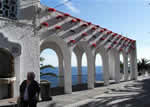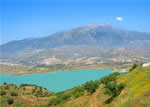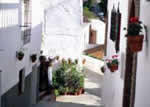|
There is a myth that Spanish people are friendly. I know this to be false from personal experience. I have met rude, stand-offish, aloof, obnoxious and nasty Spaniards. Of course there may be a cultural tendency, especially in cosmopolitan Málaga, to be tolerant of others. A general tolerance might naturally have followed Franco’s rigidly intolerant rule. But, when it comes down to it, all these generalisations are daft. Spanish people are not friendly or unfriendly en masse: they are people. They might be friendly…or they might not. To mis-quote Monty Python, “They are all individuals!” |
 |
People are always tempted to make generalisations from their own (or their friends) experiences. Prior to coming to Spain, a friend of mine, a well-travelled girl who had spent years abroad, cautioned me. Her friend Karen had spent three years in Valencia. “It’s a myth that the Spanish are friendly, you know,” my friend said. “They smile and say hello, but that’s just a surface thing: you never get to know them, and you’ll never become real friends. I know Karen may have made a rod for her own back, because she didn’t learn Spanish, but still, in three years she was never once invited into a Spanish household. Not once. She found it very lonely.”
Presumably Karen expected to be invited by mime, or that the Spaniards she met should all make the effort to learn English. Still, I took the tale on board, and when we arrived in our little rented flat in Cómpeta, I expected to meet a certain amount of reserve among the neighbours, especially as neither of us were much past phrase-book Spanish. Funnily enough though, we were warmly welcomed straight away. Otilia, the old lady opposite was always out tending her fantastic array of pot-plants, and was delighted with us managing to say ‘What beautiful plants!’ It wasn’t long before she invited us to join her on her porch and try her tapas, and she managed to convey her very great worry about my strange vegetarian diet, which concerned her ever afterwards. Encarná, a couple of doors up, was often talking to Otilia, or anyone else, in a rapid-fire machine-gun rattle, from her balcony. For months we didn’t understand more than ‘Holá,’ from Encarná, but that wasn’t the point. Somehow or other we were told when something we had lost had been found, advised when it was going to rain, encouraged that our feeble Spanish would get better (poco a poco), and acknowledged with something significantly more than plain tolerance or surface smiles: warmth.
And lo and behold, within a fortnight, we were invited into one of the supposedly impenetrable Spanish houses. Angeles, from the top of our street, seeing me sat on the step with my cat, began a conversation. I think she was trying to explain that she was one of the neighbours and to tell us where she lived. Since this was round the corner, and streets didn’t go round corners in Altrincham, we were a bit lost. She promptly insisted that we step up to the house and see. Bearing in mind that the conversation was in pigeon Spanish, we weren’t sure what was happening, but went with her anyway. And in the house we met Pepe.
Pepe isn’t Spanish, he is Andaluz. He is the quintessence of the older generation of Cómpeteños. He’s short, he wears the working man’s uniform, he was born and bred here, he works on the land, and he grows his own grapes and makes his own wine. His Andaluz accent is impeccable – the end of a word never passes his lips – and, though he speaks slower than Encarná, he runs all the words together in one long, tuneful blur of rhythm and accent: “¡Holábue-nacomoes-tá,qué-hay-hombread-ios!” When you can understand Pepe you know your Spanish has come on leaps and bounds.
But Pepe is also unique. His good-humour hits you with a thump a street away, he bubbles with joie-de-vivre and bon-homie. Delighted and amused to have two stuttering foreigners to tease, he showed us gleefully around the house. When Angeles poured us a little glass of their own wine, Pepe mimed the making of it, and how to drink from a gourd, and what happens if you drink too much, while talking incomprehensibly of their cortijo, and offering us handfuls of raisins, dusting away the odd maggot, as he encouraged us to try them. Angeles gave us little cakes that were sweet enough to make you cringe and dry enough to make you cough, while Pepe asked us questions and instructed us and chased us up to the terrace to see their view, all to our total bafflement. Angeles laughed. “Pepe, they don’t understand you,” she said, and turning to us, in explanation, “Pepe is very Andaluz!”
I can give my friend some comfort. Not all her predictions were totally out. I have, to date, made no really bosom-buddy Spanish friends in the area. And I have become friends with some Brits. And I still don’t think Spaniards are, per se, friendly. The neighbours we had, Encarná, Otilia, Angeles, Pepe and others, were friendly, helpful and kind, not because they were Spanish, but because they were a really nice set of people. And as long as you’ve got good neighbours, who cares if they are Spanish, British or Outer Mongolian? Even if you don’t get into their houses!
Rose Jones



















